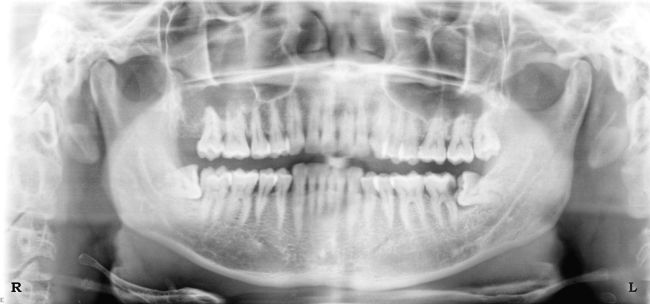Wisdom teeth, or third molars, are the last teeth to erupt in your mouth. This usually happens between the ages of 17 and 25 (supposedly heralding the person’s growing wisdom). They nestle right at the back of the mouth, behind the second molars. Not everyone has them. We have smaller jaws than our ancestors, allowing for less room in our mouths to accommodate wisdom teeth. It is widely believed that this is an evolutionary development in response to changes in our diet to less fibrous foods that require less chewing. This results in the jaws becoming smaller because the chewing muscles which are anchored to the jaws are smaller resulting in the jaw bone not needing to be as big. Because of the lack of room, wisdom teeth often don’t break through (erupt) fully or at all, instead becoming impacted (wedged against bone or existing teeth and unable to fully emerge). Tristan is skilled and here to help you with any wisdom tooth problems. We are often able to remove wisdom teeth with minimum discomfort and down-time to our patients. In addition there are many factors that you can manage to also hep with the healing.
What should be done with my wisdom teeth?
If your impacted wisdom teeth cause the following problems, you may need to have them removed:
- tooth decay that cannot be treated
- abscessing around the wisdom tooth
- infection of the gum flap overlying the partially erupted wisdom tooth
- infection of the bone (osteomyelitis)
- cysts or tumors involving the wisdom tooth
- Wisdom teeth can cause the tooth in front to decay due to food trapping
If you are worried about or are having problems with your wisdom teeth book in to see us for a wisdom tooth assessment. In particular Tristan has a great deal of experience in wisdom tooth problems & wisdom tooth removal having worked for several years in the oral surgery department of the largest hospital in Manchester
Read more on "Cost of wisdom tooth removal"
We may need to take a panorex (full mouth) x-ray to help us with your diagnosis.

Looking after your wisdom teeth
To prevent cavities and infection, extra care needs to be taken of wisdom teeth that are not fully erupted. Remember to floss between all of your teeth, and especially between the wisdom tooth and the tooth in front of it. Ensure that your brush reaches all the way to the back when brushing your teeth.
Wisdom tooth removal: how to help the healing
- To minimise the risks associated with wisdom teeth removal:
- rest up for the first 24 hours - overexerting yourself can put pressure on the surgery site and increase pain and bleeding
- avoid chewing on the site for 24 hours - try switching to a soft diet for a few days.
- avoid smoking, which promotes bleeding and slows healing
- avoid alcohol as this can promote postoperative bleeding
- avoid sucking or spitting as this can promote bleeding and dislodge the blood clot, which may lead to dry socket
- control swelling by using an ice pack manage any pain with an anti-inflammatory medication such as ibuprofen (not aspirin, which can increase bleeding)
- after 24 hours, start regular, gentle rinses of the mouth with a warm saline (salt water) solution, if recommended by your dentist
- contact us or the oral surgeon if you develop any unusual bleeding, swelling or pain. Or attend your local A&E service if this occurs after hours
Wisdom tooth removal: the risks
As with any surgical procedure, a measure of swelling, bleeding, bruising and discomfort usually follows wisdom tooth extraction. Some transient numbness of the tongue, lip or chin may also occur due to nerve injury during the extraction process. This very rarely can be permanent